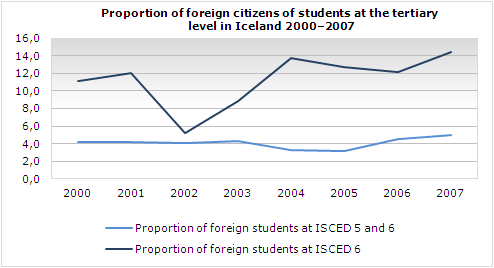Internationalization Efforts:
Due to Iceland’s remote location, as well as its small size, internationalization efforts in the education system have been a struggle. When the University of Iceland was formed in 1911, and higher education began, it made it easier for the island to become more international, especially with university students studying abroad and participating in exchange programs throughout the world (“Thematic Review of Tertiary Education”).
International and exchange students are welcomed at all higher education universities, however, certain schools (such as Reykjavik University) only teach in Icelandic for undergraduate studies, so that can be a factor for prospective foreign students. There has not been much research or statistics published, but here are a few facts:
- International students in the higher education levels were 5.2% of all students during the school year 2006-2007 (“OECD’s Publication Education at a Glance 2009”).

Chart: (“OECD’s Publication Education at a Glance 2009”).
Quality Assurance:
-
Iceland strives to have ” an incipient system of institutional monitoring, quality assurance and national accreditation” throughout all of its education levels (Thematic Review of Tertiary Education”).
-
“The setting up of both new procedures of quality assurance and mechanisms for a more sensitive form of accountability coincide chronologically with the strengthening of institutional autonomy. In Iceland, however, both are at a relatively early stage of development” (“Thematic Review of Tertiary Education”).
- The Ministry of Science, Education and Culture’s Office of Evaluation and Analysis oversees quality assurance throughout the country (“Thematic Review of Tertiary Education”).
- In regards to higher education: “The Ministry verifies that institutions meet standards for teaching and research and that their plans are implemented. The purpose of quality control is to raise the quality of teaching, to improve organization, promote greater responsibility and to ensure the international competitiveness of higher education establishments, both public and private” (Thematic Review of Tertiary Education”).


